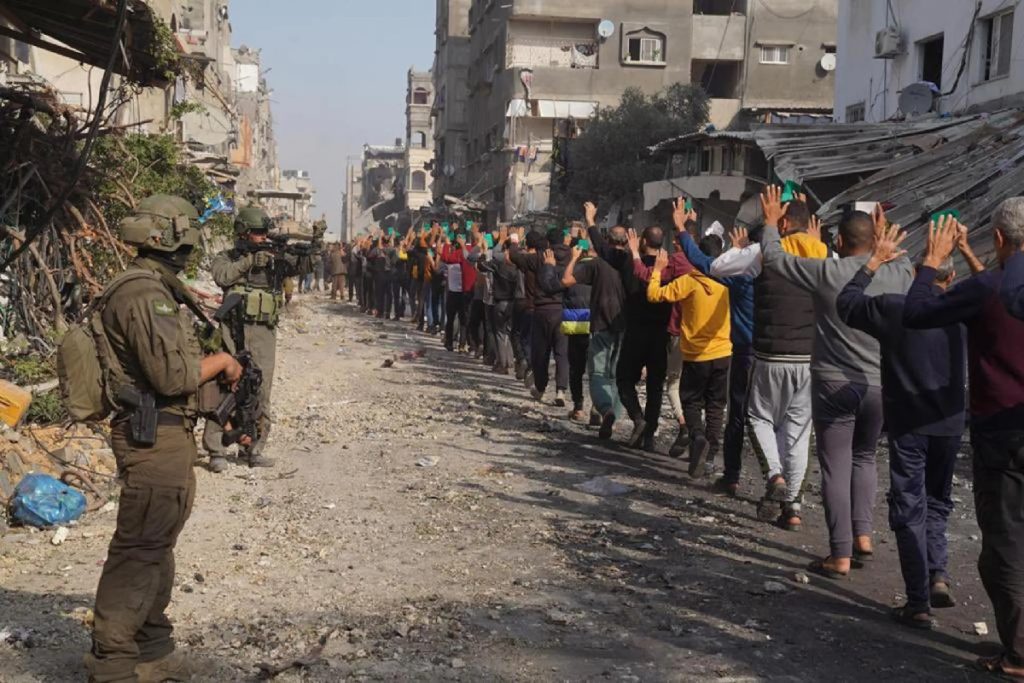Watan–A new report issued by the Palestinian Prisoners and Released Prisoners Affairs Commission and the Palestinian Prisoners Club documents new testimonies from Gaza prisoners after visits to 23 of them in the Negev Prison and the Naftali Military Camp from January 6 to 8, 2025. The testimonies provide shocking details about the systematic torture the prisoners endured.
The Commission and the Club confirmed in their report that the detention camp of “Sdeh Timmons” is no longer the main location for torture operations, including sexual assaults. They stated that testimonies from prisoners in most central prisons and camps reflected similar levels of systematic brutality.
Torment of the Afterlife
Prisoner (K.N.), 45 years old and arrested in December 2023, described his experience: “Since my arrest, I’ve been severely beaten, causing fractures in my body as they tried to extract confessions. I was held in a camp near Gaza for 58 days.” He described the experience as “like the torment of the afterlife, shackled and beaten all the time, humiliated and insulted.” He added, “When I was transferred to the Negev prison, they burned me with hot water using an electric kettle. The burn marks are still visible on my body. Today, I live in tents, which are torn, and we suffer from the freezing cold. Today, we die from the cold and hunger.”
Prisoner (A.H.), 21 years old, arrested in February 2024, testified, “During my displacement, I was taken to a camp near Gaza and held there for 12 days before being transferred to a camp in Jerusalem, then to Ofer, and finally to the Negev. Every transfer felt like a journey of torment and death. Today, as you can see, my body is covered in boils, wounds, and sores from scabies. I sleep hungry and wake up hungry. On top of that, I suffer from eye pressure problems, and I need follow-up care. I lost sight in my right eye since childhood, and now my left eye is in serious danger.”

Prisoner (M.H.), 21 years old, arrested in December 2024, shared, “The first days of my detention were horrific. I was tortured and abused. We were beaten all day long.” He added, “Then they transferred us to another place, threw sewage water on us, and urinated on us. Afterward, we were taken to a camp for 27 days, where we stayed on our knees, blindfolded, and handcuffed. Later, we were transferred to Negev prison, and today we live in torment and slow death around the clock.”
The lawyer who visited this prisoner noted that (M.H.) was wearing a torn summer garment and was shivering from the cold, while suffering from scabies covering his body.
Living in Hell
Prisoner (K.J.) described his experience: “At the beginning of my detention, we lived in hell, not knowing our fate or legal status. We were subjected to all forms of crime, abuse, and deprivation. Today, we face hunger. The food portions are minimal and unsuitable for human consumption. Most of the prisoners collect crumbs of food to have a single meal at night. Since our arrest, we’ve been deprived of sugar and salt. Today, we suffer from difficult detention conditions, deprived of all basic life necessities.”
Prisoner (M.A.), 25 years old, said, “I was arrested by the occupation army from a school, subjected to beating, strip searches, and field interrogation. I was then transferred to a camp near Gaza, then to a camp in Jerusalem, and I was shackled and blindfolded the entire time. Afterward, I was transferred to Ofer prison, and then to Negev. Today, most of the prisoners suffer from exhaustion and weakness, which worsens over time. Many of them faint, and the conditions are very difficult. Prisoners are hungry, sick, and shiver from the cold all night.”
Prisoner (M.D.) told his lawyer, “I was arrested at a shelter site with my family. After my arrest, I was transferred to the Gaza envelope, where I was held for 60 days. I was then moved to Negev prison. Due to severe beatings, I lost my prosthetic eye. Now, I suffer from a cavity in the eye, and the soldiers also took my glasses.”
The report from the Prisoners’ Commission and the Prisoners Club stated that at the Naftali camp, testimonies reflected the same level of brutality practiced in other prisons, with very few differences. The prisoners mainly focused on the initial stages of detention and interrogation, which involved extensive abuse and torture. Despite some differences in conditions compared to other camps, the prisoners largely suffer from medical crimes and deprivation of treatment. Among the prisoners visited, one is suffering from cancer and requires treatment, while another had lost family members and later his father, a loss that caused great emotional pain during the visit, leading to tears.
The report concluded that the testimonies from Gaza prisoners marked a significant shift, revealing a previously unseen level of brutality from the occupation forces, including torture, abuse, medical crimes, sexual assault, and the use of prisoners as human shields.
